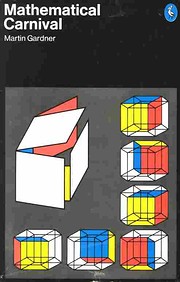

Pulse en una miniatura para ir a Google Books.
|
Cargando... Miscelánea matemática (1975)por Martin Gardner
 Ninguno Actualmente no hay Conversaciones sobre este libro.  More enjoyable for me than the last couple. Cards, Piet Hien, great mini puzzles, a mention of Brighter than a Thousand Suns, one of News Scientist's top 25 most influential popular science books (on my long term reading list to get to all of them, so guess what's next?), and in addition to a lot more, a new way to calculate the day of the week a date falls on...great stuff. Indeholder "Introduction", "1. Sprouts and Brussels Sprouts", "2. Penny Puzzles", "3. Aleph-null and Aleph-one", "4. Hypercubes", "5. Magic Stars and Polyhedrons", "6. Calculating Prodigies", "7. Tricks of Lightning Calculators", "8. The Art of M.C.Escher", "9. The Red-Faced Cube and Other Problems", "10. Card Shuffles", "11. Mrs. Perkins' Quilt and Other Square-Packing Problems", "12. The Numerology of Dr. Fliess", "13. Random Numbers", "14. The Rising Hourglass and Other Physics Puzzles", "15. Pascal's Triangle", "16. Jam, Hot and Other Games", "17. Cooks and Quibble-Cooks", "18. Piet Hein's Superellipse", "19. How to Trisect an Angle", "Bibliography". "Introduction" handler om hvorfor smuk matematik er en god ting. "1. Sprouts and Brussels Sprouts" handler om et sjovt to-mands spil opfundet af John Horton Conway og Michael Stewart Paterson, hvor man starter med et stykke papir og n punkter. "2. Penny Puzzles" handler om mønter og problemer med pakning og placering af samme. "3. Aleph-null and Aleph-one" handler om Georg Ferdinand Ludwig Philipp Cantor, overtællige mængder og Paul J. Cohen, John Farey og Farey rækken. Cohen viste at både kontinuumshypotesen og negationen af samme er konsistente med mængdelæren. "4. Hypercubes" handler om 4D-terninger. "5. Magic Stars and Polyhedrons" handler om at sætte numre på heksagrammer og lignende, så man får lignende egenskaber som ved et magisk kvadrat. "6. Calculating Prodigies" handler om hurtigregnere, dvs folk som Carl Friedrich Gauss og John von Neumann, der kunne gange fircifrede tal i hovedet. "7. Tricks of Lightning Calculators" handler om ??? "8. The Art of M.C.Escher" handler om ??? "9. The Red-Faced Cube and Other Problems" handler om ??? "10. Card Shuffles" handler om faro-shuffles og andre måder at blande kort på. "11. Mrs. Perkins' Quilt and Other Square-Packing Problems" handler om ??? "12. The Numerology of Dr. Fliess" handler om ??? "13. Random Numbers" handler om ??? "14. The Rising Hourglass and Other Physics Puzzles" handler om ??? "15. Pascal's Triangle" handler om binomialkoefficienterne og diverse sammenhænge med fx fibonacci-tallene. "16. Jam, Hot and Other Games" handler om ??? "17. Cooks and Quibble-Cooks" handler om ??? "18. Piet Hein's Superellipse" handler om Stockholms byplan for Sergeltorvet og superellipser. "19. How to Trisect an Angle" handler om folk, der tror de har tredelt vinkler, fordoblet terningen osv. "Bibliography" er vældig detaljeret og opdelt efter de 19 kapitler, dvs for hvert kapitel er der forslag til supplerende læsestof. Superunderholdende matematik. sin reseñas | añadir una reseña
Contenido en
No se han encontrado descripciones de biblioteca. |
Debates activosNingunoCubiertas populares
 Google Books — Cargando... Google Books — Cargando...GénerosSistema Decimal Melvil (DDC)793.7The arts Recreational and performing arts Indoor games and amusements Non-action games, puzzles [boardgames now 794]Clasificación de la Biblioteca del CongresoValoraciónPromedio: (3.63) (3.63)
¿Eres tú?Conviértete en un Autor de LibraryThing. |
|||||||||||||||||||||||||||||||||||||||||||||||||||||||||||||||||||||||||||||||||||||||||||||||||||||||||